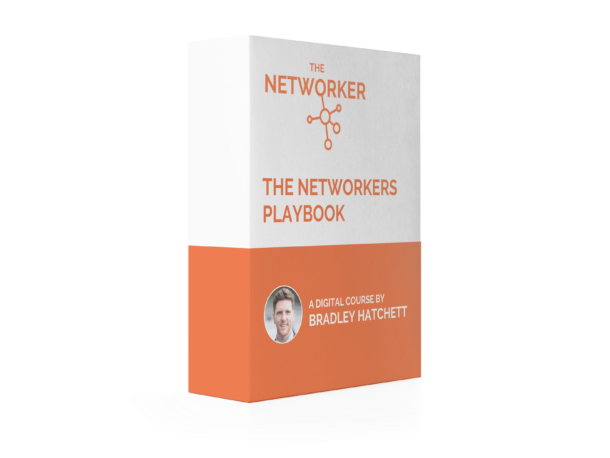The Networker #26: What To Do When You Meet a Competitor at a Networking Event
You walk into a networking event.
You start chatting to the first person you come across – it’s a competitor.
What do you do?
Today we explore this regular and almost unspoken about networking scenario.
Have you had it before where you’ve sat down at an event and the person next to you is a competitor?
Or you’re at the bar waiting for a drink and the person you start chatting to is a competitor?
Or you’ve joined a small group conversation and one of the people involved is a competitor?
It’s not uncommon.
But how do you react?
At this point you could one of two types of networker.
Networker A
You get defensive.
You put a guard up.
You may even try and alienate them from conversation or say as little as possible to them.
Because you view them as the enemy and that they’re going to steal your secrets, ideas, or even your clients.
Networker B
You’re non-combative, have an open mind and collaborative approach.
You view it as a chance connect and relate with someone on a level others there won’t be able to.
Because ultimately, this is someone who knows the industry you’re in better than anyone, challenges you face, trends you’re experiencing, and market conditions.
And has very likely followed a similar path to you.
Why Embrace Competition
I don’t believe choosing to behave like Networker A yields a huge ROI on your personal brand and reputation.
Instead, my advice if you find yourself in that situation, is think how you can be Networker B.
You never know what you could unearth about them.
Or potentially ways to work together or collaborate.
In my experience, I often meet other business network and membership leaders and find it a great way to share war stories, hear what trends they are noticing, and share best practices.
I’m not disillusioned that everyone will want join our network, and believe it’s important that people find the right one for them.
I’m also passionate about the industry, enhancing the ‘networking’ brand, debunking myths and stigmas attached to it, and protecting it.
So the more people that have a positive networking experience means a better reputation networking has.
Which means finding the right place to do so.
I have also collaborated with other networks in the past who have a very similar demographic of membership, running joint events to help create new opportunities for our respective communities.
Creating a win win.
But I’ve seen it in a number of other instances too.
Two marketing agencies who, on paper, offered identical services, worked together because Agency A was great at SEO when Agency B didn’t have the resource or real ambition to.
And Agency B was great at graphic design and Agency A didn’t have the capabilities in house.
So now they each refer that piece of respective work to one another if and when the client needs it.
Saving them overheads of employing a full time person. Knowing the quality will be good and the other side has experience of managing similar projects.
In another instance, two business coaches seemingly doing the same thing both realised they had developed experience and enjoyed focusing on different areas of running a business with their clients.
One was more financial and numbers focussed, with the other more people focussed.
So they established a way to package their areas of expertise and experience together and provide a new service.
Win win.
How Can You Get to This Point?
It starts with the frame of mind of being open to connecting with a competitor.
Understanding there may be opportunity lurking. If not someone to relate to and learn from.
Next, having good questions up your sleeve for this scenario.
Questions like:
-
- How did you get into it?
- What inspired you to start or get into it?
- What trends are you currently seeing?
- What do you enjoy doing the most?
- What’s your biggest frustration with the industry?
- What do you feel you as a company are best at?
- When you’re not doing X, what do you do outside of work?
You’re not prying into their business with these (which may be their initial fear).
You’re trying to understand and relate to someone at the same or similar level as you, in the same industry.
And by asking questions like these, you may find:
-
- Similarities in your career/business journeys
- You have mutual connections and friends
- Ways you could collaborate and support each other
- You share similar views (or frustrations)
- Insights about them or shared interests that could spark a real connection
They may be a competitor (I’ve written this word so much now I’m starting to hate it), but there’s still a human being there.
And whilst I’m not oblivious to the fact you might not find ways to work together, it costs nothing to be nice and take an interest in someone.
You just never know.
And if they don’t reciprocate, move on, forget about it. That’s a reflection of them, not you.
They’re clearly networker B…
The Wrap Up
It’s inevitable you’ll see a competitor at an event.
Unless of course, you are part of networks that operate a ‘lock out’ policy (one person per sector).
Call me new school, but it’s just not something I can get on board with.
-
- There’s plenty of work to go around
- You can’t work with everyone
- You should work with people you want to and click with (rather than because you have been paired together or ‘forced’ to work with)
Useful points to think about when considering your approach to competitors at events.
So I urge you to give it a try next time you’re at an event and find yourself in the situation.
Keep your connections close, and you’re competitors closer.
In networking, that’s healthy.
Happy Networking, Networkers.
What Is The Networker?
The weekly newsletter to help business owners and sales leaders network smarter.
1 networking tip, trend or tidbit – every Wednesday morning.
Connect With Me
Previous Editions
The Networker #56: How To Research The Event Guest List Like A Pro
The Networker #56: How To Research The Event Guest List Like A ProRead time: 3 minutes & 22 secondsAll networkers have been told at some point; “research the guest list before an event”. But few share practical ways to do so. Until now. But preparing and...
The Networker #55: 4 Ways To Improve Your Conversations
The Networker #55: 4 Ways To Improve Your ConversationsRead time: 3 minutes & 22 secondsWhen someone recommends a book to me, I don’t rush to buy it right away. Here’s what I do. Search for the author on Spotify to find podcasts they’ve appeared on. What you find...
The Networker #54: What Time Of Day Is Best For Networking?
The Networker #54: What Time Of Day Is Best For Networking?Read time: 2 minutes & 12 secondsMorning, afternoon, or evening? What’s the best time to network? Today I talk through this old age conundrum with networking. Because networking becomes more enjoyable and...
The Networker #53: How Doing This Online Expands & Deepens Your Connections
The Networker #53: How Doing This Online Expands & Deepens ConnectionsRead time: 3 minutes & 09 secondsShowing your human side online is an easy (and free) way to improve your networking experience. Whilst also creating opportunities and connections from where...
The Networker #52: How To Increase Your Enjoyment From Networking
The Networker #52: How To Improve Your Enjoyment From NetworkingRead time: 1 minute & 20 secondsNetworking and playing golf have a lot in common. Before I lose you, you don’t have to like or play golf to understand this edition. Replace golf with any sport you...
The Networker #51: Build 1000 Relationships A Year, In 3 Minutes Per Day
The Networker #51: Build 1000 Relationships A Year, In 3 Minutes Per DayRead time: 2 minutes & 11 secondsHow could you nurture 1000 relationships this year? Jesse Itzler will. In under 3 minutes a day. How?! Itzler shared his approach on a podcast that he uses to...
The Networker #50: 7 Networking Lessons From 50 Editions
The Networker #50: 7 Networking Lessons From 50 EditionsRead time: 3 minutes & 46 secondsA year ago, I committed to writing a weekly networking newsletter. As I hit 50 editions, I reflect and realise there are lessons and principles that can be applied to...
The Networker #49: Enhance Your Networking Performance – Just Like Your Workouts
The Networker #49: How To Enhance Your Networking Performance (Just Like Your Workouts)Read time: 3 minutes & 22 secondsIt’s the start of January. We’re all detoxing eating almonds and spinach. Hitting the gym and getting in shape is top of mind for many. Given...
The Networker #48: What I’d Tell My Younger Self About Networking
The Networker #48: What I'd Tell My Younger Self About NetworkingRead time: 1 minutes & 49 secondsI was 22 when I started networking in my professional life. Truth is, I was doing so before I even had my first ‘proper’ job. I got that job as a result of someone I...
The Networker #47: Best Editions of 2023
The Networker #47: The Most Shared Editions of 2023Read time: 3 minutes & 44 secondsI spent a white trying to think of a quirky acronym for these awards. The NOTYA’s 2023 is the best I’ve got. The Networker Of The Year Award 2023. Where I recognise the editions...

